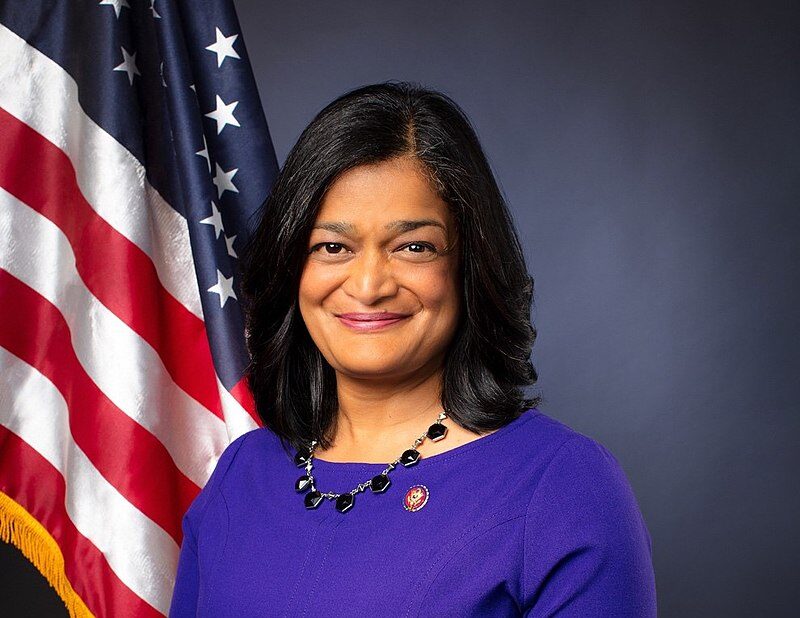Congresswoman Pramila Jayapal (WA-07) and Senator Edward J. Markey (D-Mass.), a member of the Senate Health, Education, Labor and Pensions (HELP) Committee and author of the Green New Deal for Health, today announced the introduction of the Granting Resources for Eliminating Emissions Now in (GREEN) Hospitals Act. The legislation would provide $105 billion to revive a New Deal-era program to modernize and weatherize health facilities in order to reduce emissions, protect public health, and ensure that more Americans have access to health care before, during, and after climate disasters and extreme weather events.
“As hospitals across America provide critical lifesaving care every day, we must ensure they are able to operate under severe weather conditions that have become far too prevalent due to the climate crisis,” said Congresswoman Jayapal. “This legislation would give hospitals the funding and resources they need to increase capacity, be more resilient in the face of public health crises and climate disasters, and reduce their environmental footprints. I’m so proud to join Senator Markey in introducing this bill to safeguard our nation’s collective health while protecting our planet for future generations.”
“From raging wildfires to devastating flooding, the climate crisis is here, and our health care system is not immune. High winds create power outages – leaving patients and providers without lifesaving equipment. Flooded hospitals shut down, and patients must travel further or wait longer for care. Meanwhile, outdated hospital infrastructure spews dirty emissions into our atmosphere,” said Senator Markey. “Health systems are meant to be a port in the storm, but they cannot be if they don’t have the infrastructure to protect us now and in the future. The GREEN Hospitals Act is an essential step towards a health system that recognizes that climate justice is health justice.”
As the climate crisis brings stronger storms, hotter heat waves, and more severe wildfires to communities, the United States’ aging medical infrastructure is increasingly at risk. Hundreds of hospitals along the East Coast are currently at risk of flooding from hurricanes. Heatwaves and wildfires threaten the power infrastructure of the health care system across the West. Devastating tornadoes have already destroyed critical rural hospitals in the South. Severe flooding is forcing health care facilities to close, including Norwood Hospital in Massachusetts. Medical facilities are still recovering from the COVID-19 pandemic, and they lack the capital to invest in critical infrastructure that would improve pre-disaster mitigation and climate resiliency. In addition to people requiring acute medical attention in the aftermath of extreme weather, communities rely on undisrupted access to care. Pregnant people need access to prenatal care, people with opioid use disorder need access to medication treatment, and kidney patients need access to dialysis.
Specifically, the GREEN Hospital Act would invest $100 billion to revive the New Deal’s Hill-Burton grant program to fund capital projects that increase capacity to provide essential health care and update facilities to become more resilient to climate disasters and public health crises. In exchange for Hill-Burton funding, medical facilities would commit to a community service obligation to provide a specific amount of free or below-cost health care services to qualified individuals unable to pay. The legislation would also provide $5 billion into planning grants to fund pre-development planning needs, such as community assessments and engineering evaluations, so sustainability and resiliency projects for medical facilities meet the needs of the surrounding communities and patient populations.
A copy of the GREEN Hospitals Act can be found HERE. A copy of the one-pager can be found HERE.
The legislation is endorsed by Health Care Without Harm, Boston Medical Center, and Providence Hospital System.
“As a safety-net trauma center in a coastal city, which serves the area’s most vulnerable patient population, going green and building for campus resiliency is critical to Boston Medical Center (BMC) delivering on its mission. In order to care for patients and maintain emergency access to critical care services during a natural disaster, BMC has proactively made changes to increase resiliency of critical care hospital infrastructure. BMC supports Senator Markey’s introduction of the GREEN Hospitals Act in order to bring critical federal resources to bear to further bolster the health sector’s role in mitigating the climate crisis,” said Bob Biggio, Senior Vice President of Facilities and Support Services at Boston Medical Center.
“If we do not act quickly, the climate crisis threatens to undo the greatest public health achievements of the 20th century and disrupt health care operations across the country. Senator Markey’s Granting Resources for Eliminating Emissions Now (GREEN) in Hospitals Act will build the critical hospital infrastructure we need to speed recovery from and prepare for the extreme weather events and wildfires that impact so many people in the U.S. The GREEN Hospitals Act will ensure our nation’s health care systems are climate-smart and climate-resilient,” said Dr. Antonia Herzog, Director of Climate Policy and Advocacy at Health Care Without Harm.
















